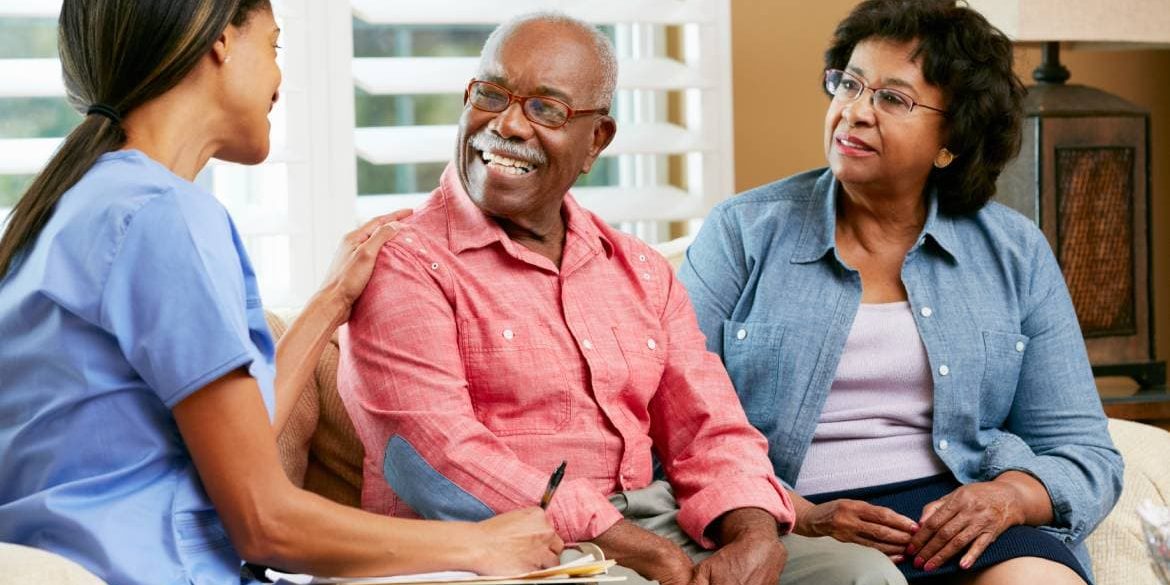
If your loved one has a serious or life-limiting illness, the care tips below will help you care for them at home.
Families of Samaritan’s Hospice Care patients should call us at (856) 596-1600 for advice, any time or day or night if:
Managing pain is vital for allowing your loved one to live well during serious illness. Please see helpful tips below:
If your loved one is experiencing shortness of breath or a feeling that they can't get enough air, please try the following:
A major cause of constipation is main medications. Please use these helpful suggestions to ease any constipation your loved one may be experiencing:
Use the following calming tips if your loved one becomes restless, tense, or upset. Agitation is a behavioral, confrontational, physical disturbance that is, at times, a result of heightened anxiety and can also be a sign of uncontrolled pain:
Feelings of anxiety or sadness are normal and expected during serious illness. Please let your care team know of any anxiety or sadness, so that we my help, and try the following to help your loved one:
Find helpful tips here for helping your loved one with nausea or vomiting. Nausea can occur for multiple reasons: Is it medication related? Occur after meals? Occur with movement? Smell induced? Anxiety-related? Notify your nurse if nausea is persistent.
For Nausea:
For Vomiting:
If your loved one develops a fever, please try the following suggestions. (The thermometer may be placed under the arm. Add one degree to reading for temperature):
Should your loved one develop a dry mouth, please use the following tips to offer comfort and relief:
Gurgling or noisy breathing often indicates a change in condition. Please do not hesitate to call your nurse. Here are ways to assist your loved one:
How can you help your loved one with their everyday care needs?
Check the caregiver tips below, and don’t hesitate to ask Samaritan Care Team for more training on any of these topics.
These skills, combined with the love and commitment of family and friends, can produce the very best results for the comfort of your loved one.
Wash your hands thoroughly with soap and water beofre and after caring for your loved one, and before preparing or handling food. Wash your hands after removing disosable gloves or handling your loved ones's soiled linens or supplies.
How to properly wash your hands:
Disposable goves should be worn:
The body’s need for high calorie and protein foods may be altered during illness because of decreased activity, exercise, general metabolic rate, and the way the body uses food.
The most common problems many family members face are finding the right kinds of food and difficulty in getting the patient to eat. Too often this “food struggle” can develop into friction that will interfere with open communication in the family.
You may avoid this struggle by allowing your loved one to eat what he or she wants.
Please do not hesitate to ask your Samaritan Care Team for additional explanation or to answer any questions you may have.
When someone is confined to a bed or chair, frequent repositioning is essential. Reposition your loved one every 2 hours in bed and every hour in a chair to help prevent pressure sores.
Keep the angle of the head of your bed at less than 30 degrees when you are not eating or drinking.
Use pillows to protect against long periods of pressure on “bony prominences” (for example, between ankles, knees, behind back, under elbows, under calves to float heels). Tell your Samaritan Care Team right away if you notice areas of concern on loved one’s skin.
Keeping your loved one’s mouth clean may help prevent aspiration pneumonia. Aspiration pneumonia is caused when a substance such as food, excessive saliva, or any foreign substance is inhaled into the lungs.
While doing mouth care, inspect the mouth and tongue for signs of sores or reddened areas. A flashlight can aid in this process. These sores not only cause discomfort and pain but can cause difficulty eating or drinking. Inform your nurse of white patches or sores in the mouth. You should provide mouth care at least three times a day, after meals and as tolerated.
Supplies:
Procedure:
About an hour before changing linens or giving a bed bath, be sure your loved one has taken pain medication. This will reduce the discomfort of movement. If there are medication patches, be sure not to loosen them.
The thought of making the bed — with your loved one in the bed — can be overwhelming, but a nurse or home health aide will be happy to show you how it is done.
Supplies: Sheets and pillowcases, lift sheet, incontinent pads.
Procedure:
Supplies: A big bowl with warm water, soap, two or three towels and a washcloth, a light blanket to prevent chills, lotion, and/or shaving materials, if desired.
Procedure:
It is very relaxing to place your loved one’s hands and feet in the bowl of warm water for washing. Remember to put a towel under the bowl in case of spills.

Our 24/7 Call Center provides you with the security of knowing help is never more than a phone call away – all day, every day.
(856) 596-1600